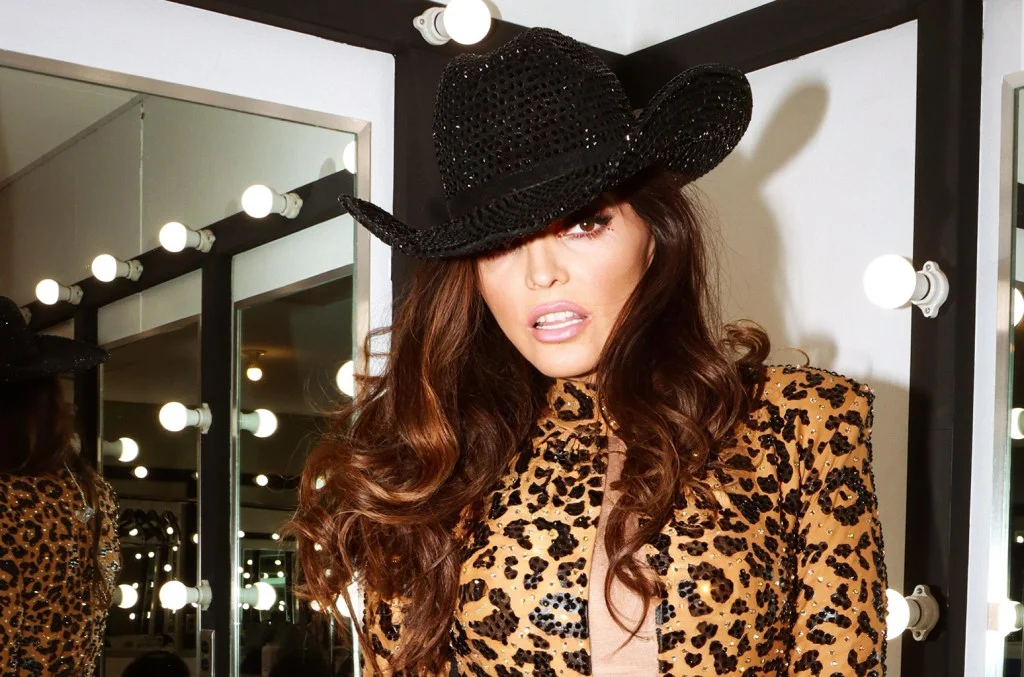Latin Women In Music
Selena Gomez received the Woman of the Year award at the 2025 Billboard Latin Women in Music event on Thursday (April 24).
The Texas-born star wasn’t there in person to accept the honor but expressed her gratitude in a heartfelt speech she delivered via video.
The Woman of the Year award is presented to a female artist who has demonstrated exceptional success, leadership and cultural influence in the music industry and beyond. Previous Women of the Year honorees at Latin Women in Music include Shakira and Karol G.
Below, Selena Gomez’s full speech:
Thank you so much to everyone at Billboard. I wish I could be there with all of you, but I’m filming in New York. This means so much to me as a Latina. I have been working most of my life and to be seen, supported and celebrated by women who share our roots is truly, truly powerful.
Growing up, I was extremely proud of my Mexican heritage. I didn’t see a lot of women who looked like me at the center of the story or onstage and it was just rare. Our stories, our voices and our cultures deserve to be celebrated.
Trending on Billboard
Releasing my EP Revelación was one of the proudest moments of my career only because it felt like I was creating music for something that I had wanted to give my heritage and my family, and for myself. Not only did it give me another opportunity to highlight my culture, but also I knew it would make my abuela very proud.
And finally, to my fans, I can never say it enough: It’s because of you that I’m able to do what i love. And thank you all for supporting me for all of these years. Thank you from the bottom of my heart. I love you all, te amo.
Hosted by 2024 honoree Ana Bárbara, the third annual edition of the Billboard Latin Women in Music special was broadcasted live exclusively on Telemundo, Universo, Peacock, and the Telemundo app, and throughout Latin America and the Caribbean via Telemundo Internacional.
The 2025 honorees also included Selena Gomez as Woman of the Year, as well as Celia Cruz (Legend Award), Olga Tañón (Lifetime Achievement Award), Belinda (Evolution Award), Natti Natasha (Unstoppable Artist Award), Anitta (Vanguard Award), Chiquis (Impact Award), and Ha*Ash (Unbreakable Award).
For the Billboard Latin Women In Music 2025 executives list, click here.

Ana Bárbara and Yahritza y Su Esencia delivered an unforgettable performance of “Besos Robados” at the 2025 Billboard Latin Women in Music event on Thursday (April 24). The collaboration created a magical moment that honored the past, present and future of regional Mexican music.
The stage transformed into a luminous desert landscape, complete with glowing cacti and a full moon, setting the perfect atmosphere for the emotional ballad. Ana Bárbara dazzled in a crystal-encrusted cowboy hat paired with a fur-trimmed top, exuding iconic glamor, while Yahritza brought a contemporary edge in her relaxed, baggy attire. Together, their powerful vocals soared, sending chills and leaving an indelible mark on the night.
Trending on Billboard
The duet between the iconic regional Mexican singer-songwriter and the rising sibling trio showcased the beauty of intergenerational artistry and celebrating the profound impact of women in Latin music.
Released last Friday, “Besos Robados” is a heartfelt ballad that delves into themes of heartbreak, longing and the bittersweet process of letting go. “You, who inspired me so many, many melodies/ You left my heart so empty/ I’d better say goodbye (I wanted you by my side, but today they are stolen kisses),” they sang in Spanish.
In addition to being one of the evening’s performers, Ana Bárbara also took on the role of host for the prestigious gala. Last year, she received the Lifetime Achievement award at the gala.
The third annual edition of the Billboard Latin Women in Music special is broadcasted live exclusively on Telemundo, Universo, Peacock, and the Telemundo app, and throughout Latin America and the Caribbean via Telemundo Internacional.
The 2025 honorees also include Selena Gomez as Woman of the Year, as well as Belinda (Evolution Award), Natti Natasha (Unstoppable Artist Award), Anitta (Vanguard Award), Chiquis (Impact Award), Ha*Ash (Unbreakable Award), and Celia Cruz, who, on the centenary of her birth, is posthumously recognized with the Legend Award and featured in the new Billboard Español cover story.
Watch coverage on the pink carpet during Billboard’s livestream here.
For Billboard’s Latin Women In Music 2025 executives list, click here.

Three superstars of Latin music — reggaetón icon Ivy Queen, salsa legend La India and merengue star Olga Tañón — paid vibrant tribute to Celia Cruz during the third edition of Billboard Latin Women in Music, broadcast live on Thursday (April 24) via Telemundo.
In a colorful number very much in the style of the Queen of Salsa, with background visuals that went from a tropical jungle to a colorful carnival, Tañón opened the set with a fiery version of “Yerbero Moderno,” Ivy Queen followed with a vibrant rendition of “La Negra Tiene Tumbao,” and La India honored her godmother Celia with the dazzling classic “Quimbara,” before all three united in a masterful final chorus.
In honor of the centennial of Cruz’s birth, which is being celebrated this year, Cruz — born in 1925 and passing away in 2003 due to a brain tumor — was posthumously awarded the Legend Award. The honor was presented by Cuban singer Goyo, who spoke about how, as a child, she had the opportunity to meet the Queen of Salsa and sing for her. A video featured scenes from Celia’s life and impact, with testimonies from Gloria Estefan, Ivy Queen, Olga Tañón, and La India about the influence the “Guarachera de América” had on their lives and careers.
Trending on Billboard
Cruz was also celebrated this week by Billboard Español with a cover story featuring testimonials from Emilio Estefan, La India, Randy Malcom, and Goyo.
Known for timeless tropical hits like “La Vida Es un Carnaval,” “La Negra Tiene Tumbao,” and “Ríe y Llora” — and celebrated for her iconic “¡Azúcar!” catchphrase, her vibrant personality, and her flamboyant outfits — the Cuban superstar is recognized as a cultural icon and one of the most influential vocalists in history, with nearly 40 albums recorded.
Each of the artists in Thursday’s tribute has been honored at Latin Women in Music: Ivy Queen received the Icon Award in 2023, La India was recognized with the Pioneer Award in 2024, and Tañón received the Lifetime Achievement Award this year.
Hosted by 2024 honoree Ana Bárbara, the third annual edition of the Billboard Latin Women in Music special is broadcasted live exclusively on Telemundo, Universo, Peacock, and the Telemundo app, and throughout Latin America and the Caribbean via Telemundo Internacional.
The 2025 honorees also include Selena Gomez as Woman of the Year, as well as Belinda (Evolution Award), Natti Natasha (Unstoppable Artist Award), Anitta (Vanguard Award), Chiquis (Impact Award), and Ha*Ash (Unbreakable Award).
For Billboard’s Latin Women In Music 2025 executives list, click here.
Mexican-American duo Ha*Ash showcased its signature Latin pop sound with country influences at the third edition of Billboard Latin Women in Music, broadcast live on Thursday (April 24) via Telemundo.
Hanna and Ashley, the Louisiana-born sisters of Mexican descent, shined while performing a medley of songs including “Perdón, Perdón” and “Estés Donde Estés,” showcasing the power of their voices and harmonies, each carrying her own guitar. Moments later, they received the Unbreakable Award from bachata star Prince Royce, who called them “two women with talent on another level.”
“This award is a celebration and a reminder that there is strength in unity, and our strength has been being sisters, partners in crime, and never letting go through thick and thin,” Hanna said while accepting the award.
Trending on Billboard
“Our career has been like a chain; each person is a link,” Ashley added, thanking her team, her family, and her fans, whom she called “the strongest link” and her “greatest source of love.”
Recognized for their resilience, innovation, and empowerment, Ha*Ash made an impressive debut in 2004, earning their first top 10 hit on the Latin Pop Airplay chart with “Estés Donde Estés,” which reached No. 9.
Over the years, the duo has showcased its staying power, racking up a total of 16 entries on the chart, four of which landed in the top 10. Recently, the sisters made a notable comeback with “El Cielo Te Mandó Para Mí,” a standout track from their album Haashville, which climbed to No. 7 on Latin Pop Airplay. They are currently on their Haashville Tour across the U.S. and Canada.
Hosted by 2024 honoree Ana Bárbara, the third annual edition of the Billboard Latin Women in Music special is broadcasted live exclusively on Telemundo, Universo, Peacock, and the Telemundo app, and throughout Latin America and the Caribbean via Telemundo Internacional.
This year’s honorees also include Selena Gomez as Woman of the Year, as well as Olga Tañón (Lifetime Achievement Award), Belinda (Evolution Award), Natti Natasha (Unstoppable Artist Award), Anitta (Vanguard Award), Chiquis (Impact Award), and Celia Cruz, who, on the centenary of her birth, is posthumously recognized with the Legend Award and featured in the new Billboard Español cover story.
Watch Ha*Ash on the pink carpet during Billboard‘s livestream here.
For Billboard’s Latin Women In Music 2025 executives list, click here.

Chiquis invigorated the stage at the 2025 Billboard Latin Women in Music event with an electrifying live performance on Thursday (April 24) that showcased her artistry and paid homage to her roots.
The Mexican American singer delivered a medley of “Qué Me Vas a Dar” — a heartfelt cover of her legendary mother Jenni Rivera — and her empowering anthem “Por Qué Soy Abeja Reina,” a bold declaration of her individuality, but important lessons she learned from her mom. Backed by a robust banda ensemble, Chiquis proved why she’s a force to be reckoned with in Latin music and beyond.
Dressed in a striking burgundy gown paired with a matching cowboy hat, Chiquis commanded the stage as her powerful vocals soared. Behind her, a shimmering iridescent visual of a diamond display added another dimension to the performance, enhancing the emotional energy of the moment.
Trending on Billboard
Her accomplishments extend far beyond music. Chiquis was honored the Impact Award at this year’s ceremony for her philanthropic and entrepreneurial endeavors.
“Thank you for recognizing the great work. To the people who have been with me since I started this career, there were many moments when I wanted to give up, to throw in the towel, because it was a very difficult path. I always had my vision clear: having a microphone is a great responsibility. It’s not always going to be easy, I understand that, I lived it with my mother. Thank you for giving me strength when I didn’t have it. I started this to inspire and to empower. ¡Arriba las mujeres!” Amandititita delivered Chiquis her prize.
“I have to use my voice, not just to sing, but to send light and radiate love, and talk about the things that really matter to me,” Chiquis told Billboard earlier this week. In tandem with her musical career, she also launched her Boss Bee Nation initiative in 2014, to help those in need. “A lot of artists are afraid to speak their truth or stand behind what they believe in because it might affect and trickle their streams, but I don’t like to worry about that. I feel that if I’m my authentic self and use my platform for things that I believe in, and my heart is in the right place, you’re not going to lose the people who are important to you.”
The third annual edition of the Billboard Latin Women in Music special is broadcasted live exclusively on Telemundo, Universo, Peacock, and the Telemundo app, and throughout Latin America and the Caribbean via Telemundo Internacional.
The 2025 honorees also include Selena Gomez as Woman of the Year, as well as Belinda (Evolution Award), Natti Natasha (Unstoppable Artist Award), Anitta (Vanguard Award), Ha*Ash (Unbreakable Award), Olga Tañón (Lifetime Achievement Award),and Celia Cruz, who, on the centenary of her birth, is posthumously recognized with the Legend Award and featured in the new Billboard Español cover story.
Watch Chiquis on the pink carpet during Billboard’s livestream here.
For Billboard’s Latin Women In Music 2025 executives list, click here.

Anitta delivered a stripped-down yet emotionally charged performance at the 2025 Billboard Latin Women in Music event on Thursday (April 24), captivating the audience with her deeply personal ballad, “Larissa.”
Accompanied only by an acoustic guitarist, the trilingual superstar showed her soul through deep lyrics and a soulful vocal performance, revealing a vulnerable side rarely seen behind her electrifying stage persona. Dressed in a delicate nude lace dress, Anitta delivered a moment that was as intimate as it was powerful on a stage framed by smoke, genuinely connecting with the audience.
Yailin La Más Viral was in charge of introducing Shakira on screen, who praised the reach of funk and its ability to blend the past with the future, taking music to new heights. In this context, Anitta took the moment to share a powerful message about the impact of artists on society:
Trending on Billboard
“I believe that we, artists, are in this position with many people watching us, not only to entertain, but to change society,” said the Brazilian artist. “We have thousands of people watching us, and the importance of having an award like this [is immense]. We would like to see more men supporting us for society to change; not only women should support the cause, but also men.”
As the recipient of this year’s Vanguard Award — an honor recognizing an artist who boldly forges her own path — Anitta’s performance was a powerful statement of creativity, resilience, and vision.
Beyond the music, Anitta has embraced a more personal and reflective chapter in her life, as documented in her 2025 Netflix film, Larissa: The Other Side of Anitta. The documentary explores her journey of healing and the balance between her stage persona and her true self. “I wanted to show people that everyone goes through struggles, even if it looks perfect from the outside,” Anitta recently told Billboard Español.
The third annual edition of the Billboard Latin Women in Music special is broadcasted live exclusively on Telemundo, Universo, Peacock, and the Telemundo app, and throughout Latin America and the Caribbean via Telemundo Internacional.
The 2025 honorees also include Selena Gomez as Woman of the Year, as well as Belinda (Evolution Award), Natti Natasha (Unstoppable Artist Award), Chiquis (Impact Award), Ha*Ash (Unbreakable Award), and Celia Cruz, who, on the centenary of her birth, is posthumously recognized with the Legend Award and featured in the new Billboard Español cover story.
For Billboard’s Latin Women In Music 2025 executives list, click here.

Natti Natasha showcased her romantic bachata-pop balladry at the third edition of Billboard Latin Women in Music, aired live on Telemundo on Thursday (April 24).
Wearing an elegant white silk suit and backed by a tropical ensemble, the Dominican singer performed the soulful “Vendaje” from her latest album Natti Natasha en Amargue, which debuted at No. 6 on Billboard‘s Top Tropical Albums chart in February.
The Dominican singer is honored with the Unstoppable Award at the third edition of the gala. “Thank you for allowing me to be here alive, present, without purpose. It is from a country that gave me birth, from a soul that I carry with pride, thanks to my land for giving me passion, flavor,” said the singer upon receiving her award.
Trending on Billboard
“I want to dedicate this award to the souls who are no longer with us, people who were simply celebrating life, this moment is also yours. To show that a woman can sing to the whole world,” she added, referring to the tragedy in the Dominican Republic that took hundreds of lives. She then thanked Don Omar, Becky G, Bad Bunny and many more artists who have marked her career to this day, as well as her daughter.
“Being recognized as ‘unstoppable’ makes me reflect on everything I’ve been through — every obstacle I’ve had to overcome, every tear, every sacrifice, every moment I had to be strong even when I was breaking inside,” the performer told Billboard earlier this week. “To me, being unstoppable is loving what you do with your whole heart. It’s getting back up a thousand times, even when the world tells you that you can’t. It’s being a woman, being a mother, being a proud and strong Latina.”
Billboard Latin Women in Music special is broadcasted live exclusively on Telemundo, Universo, Peacock, and the Telemundo app, and throughout Latin America and the Caribbean via Telemundo Internacional.
The 2025 honorees also include Selena Gomez as Woman of the Year, as well as Belinda (Evolution Award), Anitta (Vanguard Award), Chiquis (Impact Award), Ha*Ash (Unbreakable Award), and Celia Cruz, who, on the centenary of her birth, is posthumously recognized with the Legend Award and featured in the new Billboard Español cover story.
Watch Natti Natasha on the pink carpet during Billboard‘s livestream here.
For Billboard’s Latin Women In Music 2025 executives list, click here.

Belinda took center stage on Thursday night (April 24) at the 2025 Billboard Latin Women in Music event, where she showcased her artistic evolution with a stunning performance.
The singer appeared in a dress made entirely of flowers to perform “Cursi de Más,” framed by a floral backdrop onstage. She then transitioned into “300 Noches” with a stunning outfit featuring fringe pants, a tank top that highlighted her toned physique, and a cowboy hat. The stage design was equally mesmerizing, adorned with red roses, bubbles and a heart-shaped centerpiece that enveloped the performance in magic and symbolism.
A very pregnant Lele Pons took the stage to present Belinda with her Evolution Award. “This recognition not only celebrates my career but also my ability to reinvent myself. Ever since I launched my album, everything has led me to this moment of deep inspiration,” Belinda said as she accepted her prize.
Trending on Billboard
The Latin pop princess has proven her ability to reinvent herself by exploring genres such as corridos, cumbia and electronic music, while evolving both artistically and personally.
“Life has been a journey full of learning, growth, and constant evolution — both personally and artistically,” she told Billboard earlier this week. “This recognition not only celebrates my career, but also the power of reinvention and continuing to explore new chapters. I feel more inspired than ever and excited to share this new musical era. Being honored on a night that celebrates such powerful and talented women makes this moment even more special.”
The third annual edition of Billboard Latin Women in Music, hosted by 2024 honoree Ana Bárbara, is broadcast live exclusively on Telemundo, Universo, Peacock and the Telemundo app, and throughout Latin America and the Caribbean via Telemundo Internacional.
The 2025 honorees also include Selena Gomez as Woman of the Year, as well as Natti Natasha (Unstoppable Artist Award), Anitta (Trailblazer Award), Chiquis (Impact Award), Ha*Ash (Resilience Award), and Celia Cruz, who is posthumously recognized with the Legend Award and featured in a new Billboard Español cover story in celebration of the centenary of her birth.
Check out the list of 2025 Latin Women in Music Executives and Entrepreneurs here.
Watch Belinda on the pink carpet during Billboard‘s livestream here.

Olga Tañón brought the fire to the stage at Billboard Latin Women in Music on Thursday night (April 24), kicking off the third edition of the event, broadcast live on Telemundo.
The Mujer de Fuego (Woman of Fire) performed a commanding medley of hits that included “Basta Ya,” “El Reclamo,” “Escondidos,” “Cómo Olvidar” and “Así Soy Yo.” Moments later, she received the Lifetime Achievement Award for her unmatched influence as a merengue star from her fellow Puerto Rican friend Luis Fonsi, who called her “more than a star, a force of nature” and an “undisputed role model for Latinas” as an artist, mother and wife. He also thanked her as his “musical godmother” for having supported him early in his career by inviting him to sing with her.
“After such a beautiful career of almost 40 years, it’s been a journey of immense growth to be able to leave [something valuable] for future generations,” Tañón expressed joyfully. Having a successful career “sometimes takes a long time,” she added, “but by doing the right things, you can get there.”
Trending on Billboard
Later in the evening, Tañón will participate in a tribute to Celia Cruz alongside La India and Ivy Queen.
With nearly four decades of an artistic career, Olga Tañón has not only won hearts but has also helped shape the tropical music style, earning a special place in the history of Latin music thanks to her interpretive quality, her unmistakable mezzo-soprano voice, and her high energy on stage.
Since launching her solo career in 1992, 20 of her albums have entered Billboard’s Top Latin Albums chart, including two that reached No. 1: Llévame Contigo (1997) and Te Acordarás de Mí (1998). On the Tropical Airplay chart, she holds the record as the female artist with the most top 10 entries (29 in total), with hits like “Es Mentiroso,” “Cómo Olvidar,” and “El Frío de Tu Adiós,” to name a few.
The Grammy and Latin Grammy winner was also recognized this year by Billboard among the top 10 Best 50 Female Latin Pop Artists of All Time.
Hosted by 2024 honoree Ana Bárbara, the third annual edition of the Billboard Latin Women in Music special is broadcasted live exclusively on Telemundo, Universo, Peacock, and the Telemundo app, and throughout Latin America and the Caribbean via Telemundo Internacional.
The 2025 honorees also include Selena Gomez as Woman of the Year, as well as Belinda (Evolution Award), Natti Natasha (Unstoppable Artist Award), Anitta (Vanguard Award), Chiquis (Impact Award), Ha*Ash (Unbreakable Award), and Celia Cruz, who, on the centenary of her birth, is posthumously recognized with the Legend Award and featured in the new Billboard Español cover story.
Watch Olga Tañón on the pink carpet during Billboard‘s livestream here.
For Billboard’s Latin Women In Music 2025 executives list, click here.
There’s a nostalgia to Jeanette’s ’80s hit song “El Muchacho de los Ojos Tristes” that has transcended generations. Most recently, Selena Gomez and Benny Blanco tapped The Marías for a reimagination of the ballad, titled “Ojos Tristes,” that is part of the couple’s collaborative album, I Said I Love You First. “I am very proud […]

 State Champ Radio
State Champ Radio 



